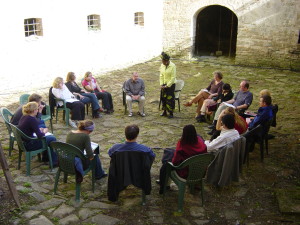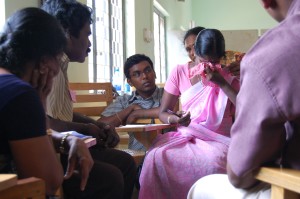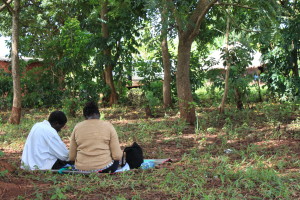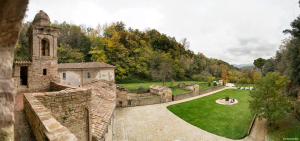Eremo delle Grotte – vivo’s home
vivo is headquartered at the “eremo” Study and Conference Center. The center is housed in a hermitage dating back to 1522 that is situated in the picturesque Marche region of Italy. The hermitage is not only a place for study, conferences and training but also an ideal environment for healing and therapeutic activities.

vivo- victim’s voice
“If I remain silent I poison my soul, silence never helps the victim.”
Elie Wiesel

In recent years, the world has witnessed an escalation of violence and atrocities in an increasing number of armed conflicts. Modern warfare aims at threatening and fighting civilians rather than foreign armies. Mass expulsions, massacres, mutilations and even genocide have become commonplace. Over 100 states worldwide continue to utilize torture against political or cultural minorities in order to maintain power. These forms of severe human rights violations have devastating effects on individuals and communities alike. According to the United Nations High Commissioner for Refugees (UNHCR), more than 30 million people are currently on flight. Most of the refugees are living in degrading conditions in refugee camps or provisional settlements in developing countries, some of them for an indefinite time. Many victims of war suffer from injuries and medical diseases, primarily due to poor hygienic conditions, absence of medical care, poverty and malnutrition. The wounds of the psyche however are also extremely disabling. Having endured or witnessed atrocious combat situations, torture, rape, or the abduction or killing of a loved one, can cause severe suffering, including nightmares, flashbacks, constant fear and grief. In many cases these symptoms do not dissipate over time. About 20-50 percent of civilians who have experienced war and persecution find themselves victims of severe psychological distress as a consequence of their traumatic experiences. Armed conflicts and violent repression are certainly detrimental for community life. The social structure of war-torn societies is destroyed when relatives and friends are dead or missing. In addition, people often feel detached from one another, withdraw from social activities, and are unable to re-establish family and community life. The psychological and social wounds of wars, persecution and immense loss can persist for decades and interfere with the reconstruction of a functioning society.

The global intensification of violence aimed at civilians in conflict situations results in a colossal challenge for aid organizations. Survivors need more than medical emergency intervention and food provisioning. Many victims need psychological support and treatment in dealing with their traumatic experiences in order to regain the capability to care for themselves and their dependents. Psychological, social and human rights-based interventions are required to facilitate the development of new and peaceful societal ways of living.
There are different approaches that aim at supporting people and communities that suffer from traumatic stress. Not all of them are effective; some of them can even be harmful. There is a great demand for research and development of best practice interventions that are both scientifically based and culturally sensitive.
Victims who suffer from psychological wounds due to traumatic events tend to remain silent about their past. They avoid talking about their experiences since remembering the traumatic event is painful, they fear that others cannot understand them. But many never forget their experiences and these are relived in nightmares and flashbacks. Outer silence and inner reliving engenders a speechless terror that hinders both individual and social adjustment after exposure to traumatic events.

One of vivo’s essential approaches is encouraging people to share their suffering. Talking about painful experiences can be a relief for the individual as it can support the integration of the experience into the victim’s personal as well as the community’s shared history. Skilled listeners who try to understand this suffering in the context of a general concern for humanity, and with access to appropriate scientific knowledge, are required to assist the restoration of the victim’s dignity. At the same time, testifying against human rights violations can be helpful for the individual, as well as the community, as it enables the sharing of pain and the construction of an empowered collective history. In this way communities may regain the power to demand the fulfillment of their human rights and justice. Building on this, work for peace and reconciliation can begin and victims can become survivors.
vivo founding members
Thomas Elbert, PhD
Professor for Clinical Psychology & Behavioural Neuroscience
Department of Psychology
University of Konstanz
Konstanz, Germany
Expertise: Research and Training in Clinical Psychology, Neuroscience
Unni Karunakara, MB BS DrPH
Senior Fellow, Jackson Institute for Global Affairs at Yale University
International President (2010-2013), Médecins Sans Frontières
Frank Neuner, PhD
Professor for Clinical Psychology and Psychotherapy
Department of Psychology
University of Bielefeld
Bielefeld, Germany
Expertise: Psychotherapy of Torture Victims & Clinical Research
Elisabeth Kaiser,MA MPH, PhD
Expertise: build-up of public mental health
structures in resource poor countries
Maggie Schauer, PhD
Department of Psychology
University of Konstanz
Konstanz, Germany
Expertise: Psychotraumatology
Monika Segbert, MBE, FLA (hon)
Information Technology Spezialist
Eremo delle Grotte
Ancona, Italy
Expertise: Public Relations, Documentation & Electronic Archiving
International Project Management
Aurelio Tassi
Italy
Expertise: Post Conflict Operations
Pietro Tassi, Land surveyor/Architect
Ancona, Italy
Expertise: Preservation & Reconstruction of Historic Monuments


